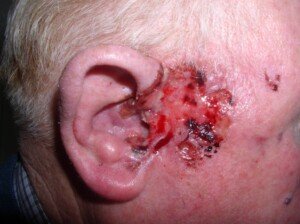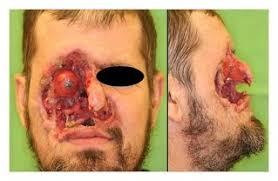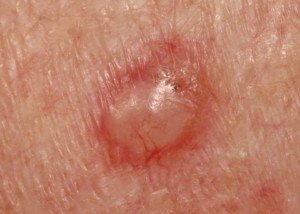
Ignoring something that looks like a pimple is one thing, but there actually exist people in industrial societies who ignore basal cell carcinoma even after it has turned their face into a grotesque form.
It’s important to see just how destructive this so-called “good cancer” can actually be.
It’s inconceivable how people in a modern society can ignore their basal cell carcinoma even after it has resulted in ulcerations and significant tissue destruction.
This phenomenon of neglect goes way beyond not caring about one’s looks.
Reasons Why a Person Would Let a Basal Cell Carcinoma Advance to Facial Destruction
“Some reasons why people may let BCC advance include fear of diagnosis and treatment, getting used to the growth, old age, low social milieu, inadequate hygienic culture and low level of knowledge about the disease,” says Cameron K. Rokhsar, MD, a double board-certified dermatologist and owner of New York Cosmetic, Skin & Laser Surgery Center.
“Many others have an underlying mental illness that interferes with proper judgment and decision-making,” adds Dr. Rokhsar.
“One major factor that contributes to the development of advanced-stage skin cancer is not seeking care for concerning skin lesions.”
An extensive report in the Journal of Skin Cancer, volume 2011, details why people in modern times will still neglect a progressively detructive growth on their face.
WARNING:
Graphic Image Below
Nevertheless, despite those recognized explanations, it’s still mind boggling how, for instance, the patient shown below ever came to neglect his basal cell carcinoma for as long as he had.

For instance, a culture for which poor hygiene is acceptable doesn’t seem to be a reason why someone would let something grow into their eye and blind them.
• Fear of what it might be? Is hearing the diagnosis worse than losing your nose?
• How do you get used to something that’s eaten away half your face?
• Low level of knowledge? The mirror shows a progressing horror.
Strangely, a teen who notices a single new pimple will freak and want to see a doctor STAT.
• The JSC reports that most of the patients seen by the paper’s authors had easy access to doctors, and media campaigns pertaining to skin cancer had reached their towns. I.e., they were not disconnected from modern civilization.
Oddly, the JSC doesn’t mention dementia or some other mental defect or psychiatric illness as a reason for ignoring basal cell carcinoma well into advanced progression.
However, the JSC cites the case of a 44-year-old patient — too young to have age related dementia.
“…he had already had a mutilating, horrifying tumor on the right side of his face for 10 months,” states the paper.
Ironically, we live in a culture where people become distressed over their first wrinkle or grey hair and spend large sums of money on cosmetic treatments to look younger.
And in that same culture are people, such as the patient above, who will avoid a medical consult well-past the point of significant facial disfigurement and even impaired function.
“It’s important to seek medical attention if you notice any abnormal growths or changes in the appearance of your skin,” says Dr. Rokhsar.
“Additionally, individuals with a family history of skin cancer, those who have been exposed to arsenic, and those taking medications that suppress the immune system, such as anti-rejection drugs used after transplant surgery, have an increased risk of developing BCC.
“It’s also important to note that BCC can recur after treatment, and patients may develop multiple lesions during their lifetimes.
“Follow-up care and regular skin examinations with a dermatologist are important to monitor for any new or recurrent lesions.
“The gold standard for the treatment of BCC is Mohs micrographic surgery, where the skin is removed layer by layer and checked for proper margin control under the microscope. I am double board certified, both in dermatology and Mohs micrographic surgery.”

 At New York Cosmetic, Skin, and Laser Surgery Center
At New York Cosmetic, Skin, and Laser Surgery Center
























